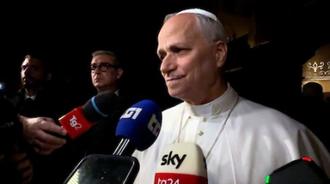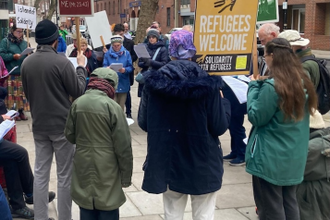Pope Leo: 'Spiritual rights' of migrant detainees must be respected

Image: Vatican Media
Source: Vatican Media
In a week when Immigrant and Custom Enforcement agent (ICE) refused to allow delegations to offer Holy Communion to migrants being held in detention centres on more than one occasion, Pope Leo appeal for their rights to be respected.
Speaking to journalists in Castel Gandolfo, yesterday evening, the Pope said that "many people who have lived for years and years" in the US, "never causing problems", are "deeply affected" by the government's policy of mass deportations.
Many migrant detainees, he said, have "been separated from their families for a good amount of time", and "no one knows what's happening".
Responding to a question from a journalist concerning the fact that Catholic migrants detained in Chicago have been denied access to Holy Communion, Pope Leo said: "the role of the Church is to preach the Gospel". He highlighted the Evangelist Matthew's account of the Last Judgement: "Jesus says very clearly: At the end of the world, we're going to be asked, how did you receive the foreigner? Did you receive him, and welcome him, or not?"
Pope Leo went on to stress the importance of protecting the "spiritual rights" of migrant detainees.
"I would certainly invite the authorities to allow pastoral workers to attend to the needs" of detained migrants, he said. "Many times they've been separated from their families for a good amount of time. No one knows what's happening … but their own spiritual needs should be attended to."
In remarks to journalists, delivered in a mixture of Italian and English, Pope Leo also expressed concern over growing tensions between the US and Venezuela.
US Marines have been deployed near Venezuelan waters for what the US has described as an anti-narcotics operations, one which Venezuelan President Nicholas Maduro has described as a pretext for "imposing regime change" to seize Venezuelan oil.
"I believe violence never brings victory," Pope Leo said, noting he had just read reports of warships moving closer to Venezuela's coast. "The key is to seek dialogue, to find fair ways to resolve the problems that may exist within countries."
Pope Leo then responded to a question on the situation in the Middle East, where a ceasefire deal has been threatened by new Israeli strikes, and settler attacks on villages in the West Bank.
"At least the first phase of the peace agreement is still holding," the Pope said, referring to an October 10 Israel-Hamas deal, before admitting that the truce was "very fragile".
He stressed the need to move to "the second phase, addressing governance and ensuring the rights of all peoples."
The issue of Israeli settlements in the West Bank, which are illegal under international law, is "is truly complex," the Pope said: "Israel said one thing, but sometimes it does another."
What is needed, the Pope emphasized, is "to work together for justice for all peoples."
Pope Leo also addressed the issue of workers' rights ahead of the upcoming Jubilee of the World of Work, in comments that came a day after a 66-year-old worker died in the partial collapse of Rome's Torre dei Conti.
"It's a human right to have dignified work that allows one to provide for one's family," the Pope stressed.
"The Church can only do so much," he noted, adding however that the upcoming Jubilee would be an opportunity "to offer some hope and to try to unite our efforts to find solutions, not just to comment on problems".
Before returning to the Vatican, the Pope answered a final question about Marko Rupnik, the ex-Jesuit priest and artist accused of abusing numerous women, whose case is currently under investigation by the Dicastery for the Doctrine of the Faith.
Responding to questions about Rupnik's artwork, which is still displayed in many churches worldwide, the Pope said that "in many places … the artwork has been covered up, artwork has been removed from websites. That issue is certainly something that we're aware of."
He confirmed that a Vatican trial against the ex-Jesuit "has recently begun".
"Judges have been appointed, and judicial processes take time," Pope Leo said. "I know it is very hard for victims to be asked for patience, but the Church must respect the rights of all individuals. The presumption of innocence until proven guilty applies in the Church as well. We hope this process will bring clarity and justice for everyone involved."
Watch a recording of the Q&A here: www.youtube.com/watch?v=A4YsMiDs4Gg&t=60s


















